Background Checks
Do Arrests Show Up on Background Checks?
Harness the knowledge on how arrests impact background checks to make informed decisions in hiring practices.

Arrests can show up on background checks, but their impact varies. Employers prioritize convictions over arrests. Different types of checks may reveal arrests. In Texas, criminal background checks cover varied records. Employers consider arrest records to gauge law involvement. Convictions provide insight into one's legal past. Candidates in Texas must consent to checks. Employers are obligated to explain adverse decisions. Accuracy in reports can be challenged. Background checks include arrests, convictions, and warrants. Compliance with regulations is essential. Maintaining safety and standards are priorities. Thorough background checks aid in selecting candidates effectively.
Key Takeaways
- Arrests can show up on background checks.
- Employers prioritize convictions over arrests.
- Texas background checks cover arrests, convictions, court records, and warrants.
- Arrest records help assess involvement with law enforcement.
- Written consent is required for background checks in Texas.
Arrests Vs. Convictions
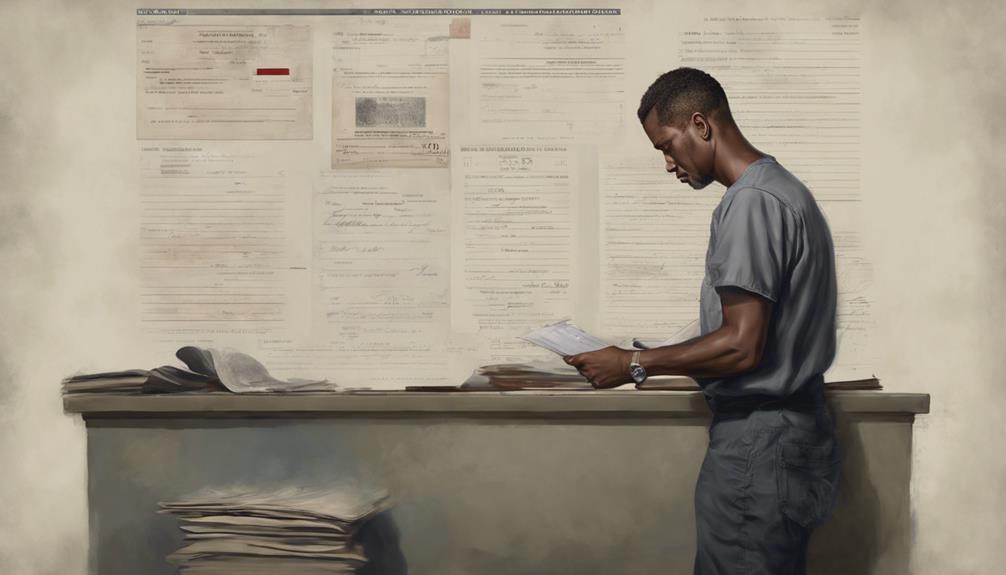
When evaluating background checks, employers must differentiate between arrests and convictions. In Texas, as in many other states, criminal records may contain information about both arrests and convictions. It's essential for employers to understand the difference between the two.
Arrests indicate suspicion, while convictions signify guilt. While arrests may show up on background checks, employers should give priority to convictions in their decision-making process.
Texas law allows employers to take into account an individual's criminal history when making hiring decisions, but they're advised to focus on convictions rather than arrests. This differentiation is important for accurate assessment during the background check process.
Types of Background Checks
Employers conduct different types of background checks to gather information on potential employees, including criminal history, employment verification, education confirmation, credit history, and other relevant details.
In Texas, criminal background checks cover convictions, arrests, court records, and warrants. Employment history verification is essential for confirming past positions and durations of service, while education verification confirms the validity of degrees, diplomas, and certifications.
Credit history checks are often used to assess creditworthiness, especially for roles involving financial responsibilities. Apart from these standard checks, employers can consider various other types of background checks such as tenant screening and personal background investigations.
Records Employers Check

Checking arrest records is a common practice for employers to determine involvement with law enforcement or instances of custody. When conducting background checks, employers focus on specific records to gain insight into a candidate's criminal history and legal entanglements.
Here are three key types of records employers check:
- Arrest Records: Employers may look into arrest records to understand if a candidate has been involved in any law enforcement incidents that could raise concerns about their suitability for a particular role.
- Conviction Records: Reviewing conviction records helps employers assess whether a candidate has been found guilty of criminal charges in the past, giving them insight into the individual's legal history and potential risk factors.
- Juvenile Records: In roles that involve working with minors or sensitive information, employers may inspect juvenile records to secure the safety and security of vulnerable populations or confidential data.
Understanding the significance of these records empowers candidates to address any potential issues proactively and navigate the employment screening process effectively.
Rights & Obligations in TX
Employers in Texas must first gain candidates' written consent before conducting background checks.
They're then required to provide explanations for any adverse decisions resulting from these checks.
Candidates retain the right to challenge any inaccuracies found in their background reports.
Consent Requirement for Checks
Before conducting background checks in Texas, candidates must provide written consent to employers. This step is essential to confirm that candidates are aware of and agree to the background check process. Once consent is obtained, employers can proceed with the necessary checks to evaluate a candidate's suitability for a position.
Transparency: Employers must clearly communicate the scope of the background check to candidates, including what information will be gathered and how it will be used.
Candidate Rights: Candidates have the right to review any adverse decisions made based on background check findings. This transparency allows candidates to understand why certain decisions were taken.
Accuracy: If candidates come across inaccurate information in their background check, they have the right to dispute it. Employers are responsible for ensuring the precision of the information presented in the background check report to maintain fairness and integrity in the hiring process.
Reasons for Adverse Decisions
Understanding the reasons for adverse decisions based on background checks is important for candidates in Texas. Employers in Texas have legal obligations to inform candidates of adverse decisions resulting from their background checks. Candidates have the right to know why they weren't selected for a job due to information in their background check.
Providing clear explanations for adverse decisions helps candidates comprehend the impact of their background check results and enables them to address any issues for future job opportunities. It's vital for candidates to be aware of the reasons for adverse decisions as it can aid in improving their job prospects.
Employers can't simply reject candidates based on background check results without providing a valid explanation, ensuring transparency and fairness in the hiring process. By understanding the reasons for adverse decisions, candidates can take necessary steps to rectify any discrepancies and enhance their chances of securing employment in Texas.
Disputing Inaccurate Information
Candidates in Texas have the right to challenge and correct inaccurate information discovered in background checks conducted by employers. To protect rights and ensure fair hiring processes, Texas candidates can take the following steps when disputing inaccurate information:
- Review the Background Check Report Thoroughly: Candidates should carefully examine the background check report provided by the employer to identify any errors or discrepancies.
- Gather Supporting Documents: It's crucial for candidates to gather any supporting documentation or evidence that can help rectify the inaccurate information in the background check report.
- Submit a Formal Dispute: Candidates should formally challenge the inaccurate information with the employer, providing clear explanations and any supporting documents to contest and rectify the inaccuracies in the background check.
Background Checks: Scope & Limitations
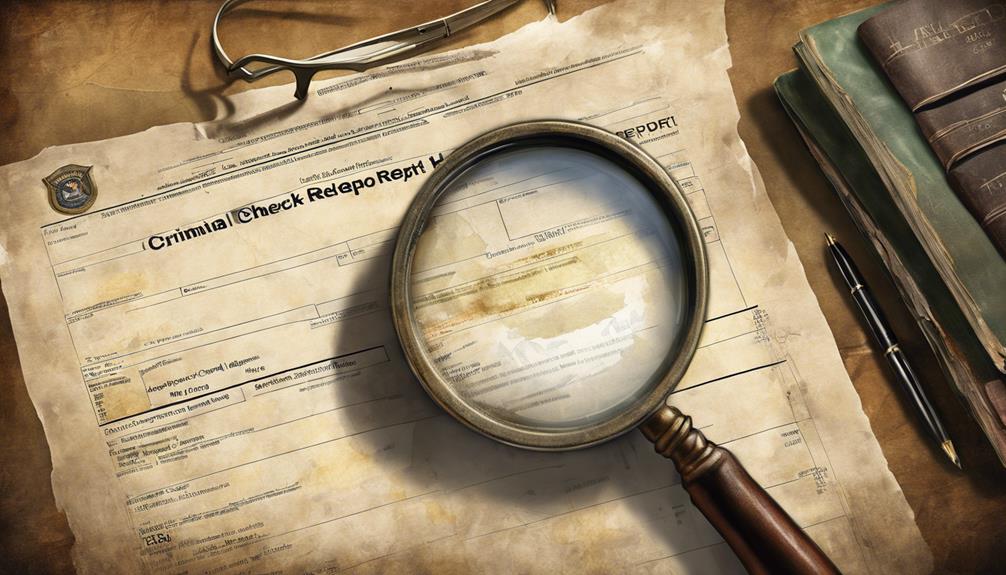
Background checks entail a thorough examination of an individual's criminal history and may have limitations regarding the reporting of certain information. In Texas, criminal background checks typically include arrests, convictions, court records, warrants, and case dispositions. Employers conducting background checks must adhere to the regulations outlined in the Fair Credit Reporting Act (FCRA), which may restrict the reporting of arrests that didn't lead to convictions.
While arrests can show up on background checks, employers need to take into account the relevance of such information to the job in question. It's essential for employers to balance the need for a detailed background check with respecting an individual's rights and privacy.
Private services or the Texas Department of Public Safety (DPS) website can be utilized to request criminal background checks, ensuring that the information obtained is accurate and up to date.
Special Considerations for Houston Industries
In Houston industries, particularly in sectors like energy and healthcare, more extensive background checks may be necessary due to the specific nature of the work involved. When it comes to background checks for Houston industries, there are several special considerations to keep in mind:
- Criminal Background Checks Go Beyond the Norm: Job applicants in these industries may undergo deeper scrutiny, including Texas criminal records, charges related to professional licenses, and any contact with law enforcement.
- Records: Including Sealed and Expunged Ones: Proper handling of sealed and expunged records is essential to prevent them from appearing in background checks for Houston industries.
- Exclusion of Certain Records: Background checks for Houston industries often exclude juvenile records and minor traffic violations, focusing instead on more pertinent information like educational background and driving records.
Considering the sensitive roles within these industries, ensuring thorough and accurate background checks is essential for maintaining safety and compliance standards.
Frequently Asked Questions
Do Arrests Without Conviction Show up on a Background Check in Texas?
Arrests without convictions can appear on background checks in Texas. Employers may access records of arrests even without resulting convictions. It is important to differentiate between arrests and convictions on background checks to address any issues proactively.
What Does a Background Check Show in Texas?
A background check in Texas reveals a person's criminal history, encompassing arrests, convictions, court records, and warrants. It provides employers and organizations with vital information on charges, classifications, sentencing, case numbers, and jurisdiction.
Do Pending Charges Show up on a Background Check in Texas?
In Texas, background checks may not reveal pending charges if no arrest has occurred. Employers might not see pending charges that lack arrests. The focus is typically on arrests and convictions rather than pending charges without arrests.
Do Pending Charges Show up on a Background Check in Alabama?
Pending charges in Alabama may or may not show up on a background check, depending on the type conducted. Employers and agencies may have varying policies. It's important to clarify the scope of the check for specifics.
Conclusion
To sum up, while arrests may show up on background checks, it's important to remember that they don't necessarily indicate guilt. Employers typically look for convictions rather than just arrests when conducting background checks.
It's essential for individuals to understand their rights and obligations when it comes to background checks, especially in industries with specific requirements.
Just as a fingerprint is unique, each individual's background check tells a different story.
Background Checks
Website for Free Background Checks: Are They Reliable?
Perusing free background check websites? Pause and ponder their reliability before proceeding to ensure informed decision-making.
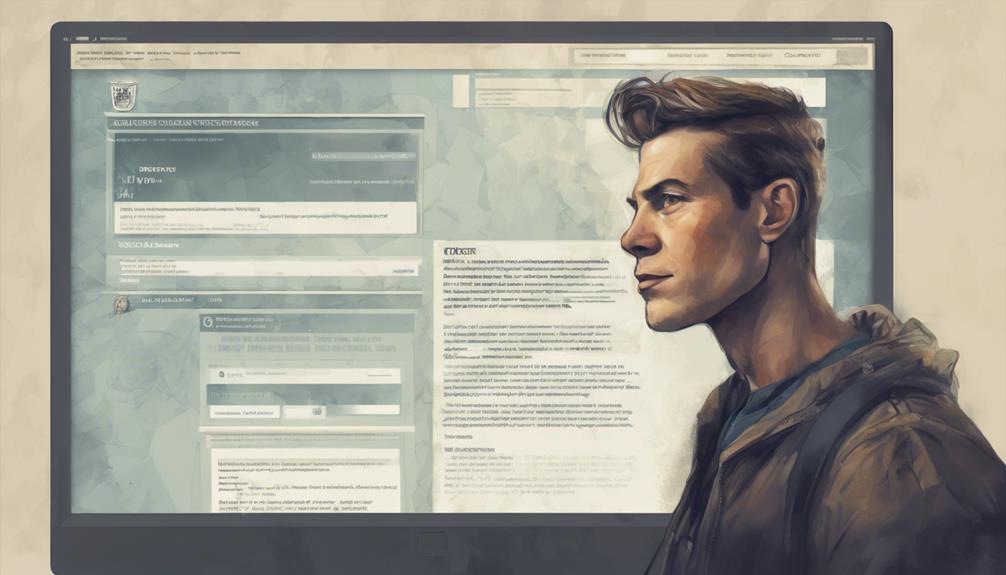
Free background check websites may offer convenience, but their reliability is often compromised by limited sources and lack of human verification, raising concerns about the accuracy of the information provided. While these platforms can be useful for basic background checks, users should approach the results with caution due to the potential for inaccuracies stemming from unreliable sources and automated searches. It is important to understand the limitations of free background checks before relying solely on them for critical decisions. Explore further insights to make informed choices regarding background screening.
Key Takeaways
- Free background check websites lack reliability due to limited sources.
- Inaccuracies can result from lack of human verification and oversight.
- Legal compliance standards may not be met, posing risks for users.
- Users may face legal consequences from unreliable data.
- Automated searches without supervision impact data validity.
Reliability of Free Background Checks
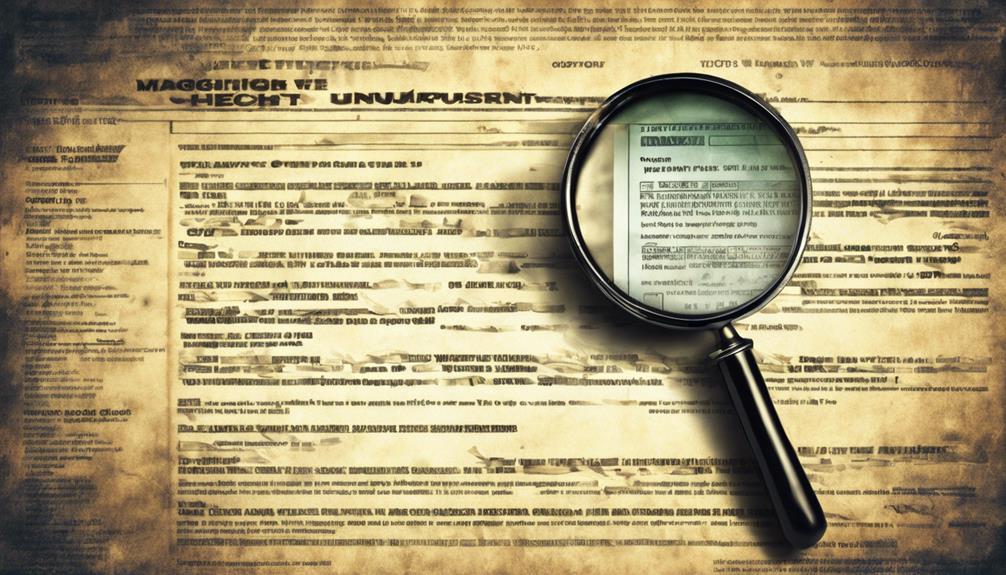
Free background checks may lack reliability, posing concerns about the accuracy of the information provided. While free online background checks offer a convenient way to access certain information like criminal records, their reliability is often questioned due to limited sources and the lack of human verification. These free checks may not always be sourced from a reliable source, leading to potential inaccuracies. Automated searches without human oversight can further impact the accuracy of the results, as there's no assurance of the data's validity.
Moreover, the absence of thorough vetting processes in free background checks raises doubts about their reliability. The focus on providing information quickly and at no cost may compromise the accuracy of the results, potentially leading to incomplete or outdated information.
Additionally, the legal compliance of these free checks is a concern, as their limitations may not meet privacy standards or other legal requirements, posing further risks to individuals utilizing such services.
Risks Associated With Free Checks
Limited sources of information in background checks that are free pose inherent risks for users. Free background checks often rely on automated searches that lack human examination, impacting the accuracy of the results. This can lead to incomplete or inaccurate information being provided to users, potentially causing them to make decisions based on unreliable data.
Additionally, free background checks may not always adhere to legal compliance standards, exposing users to potential legal consequences.
Unreliable information: Due to the lack of verification and vetting processes, information obtained from free background checks may not be trustworthy.
Accountability issues: Users face challenges in holding free background check websites accountable for any errors or omissions in the provided information.
Potential legal consequences: Relying on incomplete or inaccurate data from free background checks can result in legal issues for users, emphasizing the importance of utilizing reliable sources for background checks.
Best Free Background Check Websites

The top free background check websites in 2024, including TruthFinder, BeenVerified, Intelius, Information.com, and Instant Checkmate, offer extensive reports on individuals' criminal records and financial history. These websites are known for their reliability and accuracy, making them valuable for various purposes such as pre-employment screening and personal protection.
Users can access detailed reviews and comparisons of these platforms to make informed decisions based on their specific needs. These free background check websites play an important role in providing essential information for individuals and organizations looking to conduct thorough background checks efficiently and effectively.
With their commitment to delivering accurate and reliable results, these platforms have become go-to resources for those seeking detailed and trustworthy information on individuals' backgrounds.
Legal Considerations for Free Checks
How important are legal considerations when utilizing background check services offered for free?
When it comes to free background checks, legal compliance is essential to avoid potential legal issues and liabilities.
Here are some key legal considerations to keep in mind:
- Consent: It's vital to obtain consent from individuals before conducting a background check, even if the service is free.
- Fair Credit Reporting Act (FCRA): Free background checks may not always comply with the FCRA, which sets guidelines for how background checks should be conducted.
- Ethical Screening Process: Using free background check websites without legal compliance can raise ethical concerns. Employers should guarantee a lawful and ethical screening process to make informed hiring decisions.
Employers should be cautious and guarantee that any background checks conducted, even through free services, adhere to legal regulations to maintain a fair and lawful hiring process.
Community Insights on Background Checks

Community members actively engage in discussions about the importance of detailed background checks for maintaining safety and quality in various industries.
Office administrators stress the importance of confidentiality in background checks to preserve trust and privacy within the workplace.
Recruiters emphasize the need to carefully choose online background check services for thorough vetting of potential candidates.
Staffing services prioritize conducting thorough background checks to uphold safety and quality standards in their hiring processes.
Distribution centers aim to enhance their background check procedures to minimize risks and ensure a secure work environment for employees.
In the field of staffing services, detailed background checks are considered essential to make informed hiring decisions and mitigate potential risks in the recruitment process.
Community insights highlight the vital role of reliable background checks, especially when dealing with public data for criminal background checks or employment backgrounds, underscoring the necessity for accurate and thorough vetting processes.
Frequently Asked Questions
Are Free Background Checks Legit?
Free background checks may lack reliability due to limited sources and human verification. Incomplete information, accuracy issues, and legal compliance risks are common. Lack of expertise can lead to unreliable reports, posing potential legal problems.
What Is the Most Accurate Background Check Website?
When seeking the most accurate background check website, users can rely on platforms like TruthFinder, known for a 95% accuracy rate. Its advanced algorithms and vast data sources guarantee reliable information, aiding in informed decisions.
How Reliable Are Online Background Checks?
Online background checks vary in reliability based on data sources. Paid services tend to offer more accurate information. Reliable checks are essential for informed decisions in employment and personal life. Accuracy depends on data collection methods and reporting precision.
How Do I Know if a Background Check Is Legit?
To validate a background check's legitimacy, individuals should ensure it complies with laws like the FCRA, prioritizes ethical use of data, and maintains transparency in data handling. Verifying professional affiliations and updated information supports reliability.
Can I Trust the Accuracy of Free Background Check Websites?
When it comes to free background check websites, many people question the reliability of the information provided. While some may offer accurate results, it’s essential to be cautious and verify the authenticity of the data. For truly reliable real background checks, it’s often best to use a paid, professional service.
Conclusion
To sum up, while free background check websites can be a convenient resource, their reliability may be questionable. According to a recent survey, only 30% of users found the information provided by free background checks to be accurate.
It's important for individuals to weigh the risks and legal considerations before relying solely on these services for important decisions.
Background Checks
Do Charges Appear on Background Checks?
Yes, charges can appear on background checks, potentially affecting job prospects and legal standing.
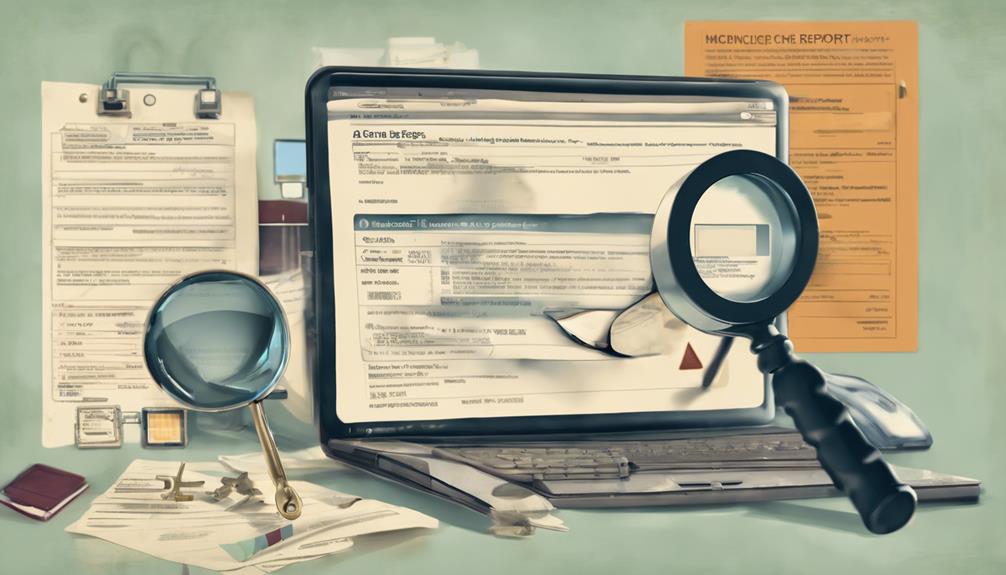
Yes, charges, whether convictions, pending cases, or warrants, can show up on background checks. These findings can impact job opportunities and legal matters for individuals.
Key Takeaways
- Charges such as arrests, convictions, and pending cases can appear on background checks.
- Types of charges, including misdemeanors and felonies, may impact background check results.
- DWI charges can affect background checks and employment opportunities.
- Pending charges are visible on background checks and can influence hiring decisions.
- Awareness of expunction and nondisclosure options can mitigate the impact of charges on background checks.
Types of Charges on Background Checks

Background checks can uncover a range of charges, such as criminal convictions, pending cases, and warrants. When it comes to types of criminal charges that may appear on background checks, individuals should be aware of the potential implications. These checks can reveal a variety of offenses, including misdemeanor charges like theft, vandalism, or drug possession, which are considered less severe than felonies.
Felony charges, on the other hand, involve more serious crimes such as assault, murder, or fraud and can have a significant impact on one's record.
Moreover, background checks may also show pending criminal charges, indicating ongoing legal proceedings against an individual. Arrest records might be included in these checks, reflecting instances where a person was taken into custody by law enforcement.
Understanding the types of criminal charges that can surface on a background check is vital for individuals seeking employment, as this information can greatly influence potential job opportunities.
Impact of DWI Charges on Records
How do DWI charges in Texas affect individuals' records on background checks?
DWI charges in Texas can have a long-lasting impact on one's record when it comes to background checks. These charges, whether dismissed, resulted in a conviction, or are pending, can appear on background checks indefinitely, potentially affecting employment opportunities.
However, there are options for individuals facing DWI charges to mitigate the impact on their records. For instance, dismissed DWI charges without probation may be eligible for deletion through expunction. Additionally, in specific circumstances, DWI convictions can be sealed with an order of nondisclosure.
It's essential for individuals with DWI charges to be aware that these records can be visible to potential employers during background checks. Understanding the options available, such as expunction and nondisclosure, can help individuals navigate the implications of DWI charges on their records in Texas.
Visibility of Pending Charges
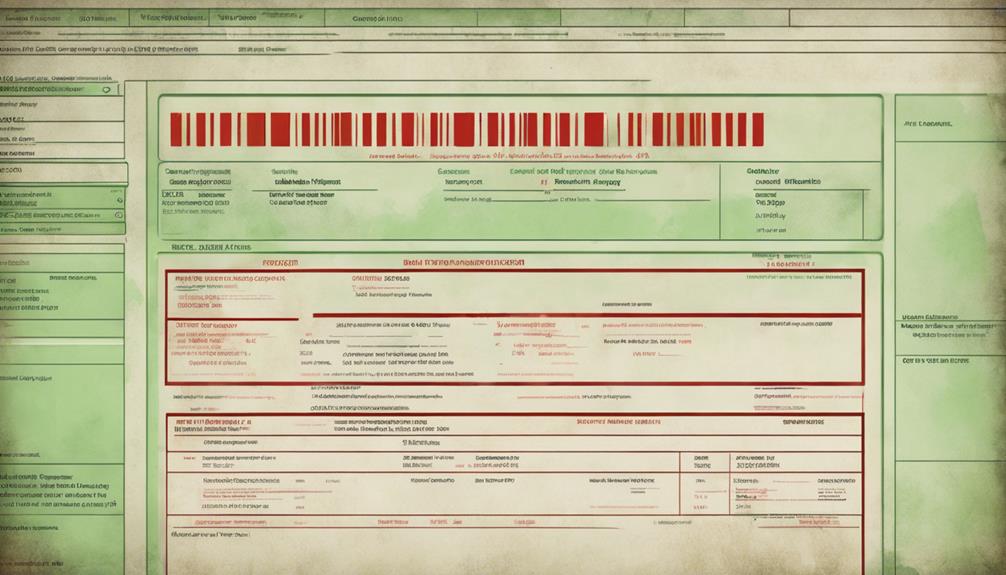
Pending charges commonly appear on employment background checks, providing insight into ongoing legal matters for candidates.
In Texas, background checks may show pending charges as part of an individual's criminal record. The visibility of pending charges can vary depending on state laws and the specific approach taken by the employer or background check provider.
When considering candidates with pending charges, employers must carefully assess the relevance of these charges to the job position and the company's policies. It's vital for candidates to be transparent about any pending charges and be prepared to discuss them during the hiring process.
Employers should handle the presence of pending charges on background checks with sensitivity and in accordance with legal guidelines. Discriminatory practices based on pending charges should be avoided, and decisions should be made based on legitimate job-related reasons.
Employment Screening Laws
Employment screening laws, including the Fair Credit Reporting Act (FCRA), set guidelines for the use of background checks in making hiring decisions. These laws aim to guarantee that background checks are conducted fairly and in compliance with regulations.
The Equal Employment Opportunity Commission (EEOC) enforces Title VII of the Civil Rights Act, which prohibits discrimination based on criminal records revealed in background checks. State laws also play an essential role, as they may dictate what information can be reported in background checks, highlighting the importance of adherence to specific state regulations.
To maintain legal compliance, employers are required to obtain written consent from candidates before conducting background checks. Additionally, individuals have the right to challenge and correct any inaccurate information found in their background checks under employment screening laws.
Components of Background Checks
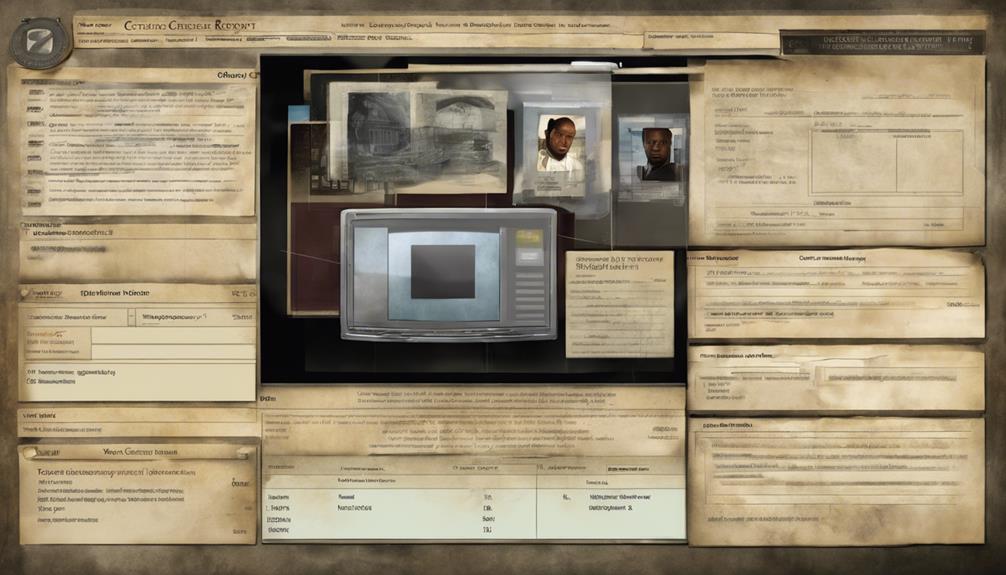
Background checks encompass a range of essential components like arrest record visibility, the expunction process overview, and prospective employer awareness. These elements play a pivotal role in providing a thorough assessment of an individual's background.
Understanding how these components interplay is important for ensuring accurate and informed decision-making in the hiring process.
Arrest Record Visibility
Arrest records, detailing past legal involvement, are a crucial part of background checks, offering a detailed overview of an individual's criminal history.
Employers may access arrest records, including charges that were filed, even if they were later dismissed.
Background checks cover arrests, convictions, court records, and warrants, presenting a thorough picture of an individual's criminal background.
The visibility of arrest records on background checks can greatly impact employment opportunities, as employers consider a candidate's legal history.
Understanding the components of background checks, such as arrest record visibility, enables individuals to anticipate what information potential employers might discover.
Given the impact arrest records can have on employment prospects, individuals should be aware of what these records entail and how they might be perceived by those conducting background checks.
Being informed about the inclusion of arrest records in background checks allows individuals to prepare adequately and address any concerns employers may have regarding their past legal involvement.
Expunction Process Overview
Considering the importance of expunction in clearing one's criminal history from background checks, understanding the procedural overview of this process is vital for individuals seeking to move forward with a clean record.
The expunction process typically involves filing a petition through a criminal defense lawyer and obtaining a judge's approval. This legal remedy allows for the removal of past arrests from public record, including dismissed charges. Once expunction is granted, individuals can legally deny any past arrests that have been expunged on job applications.
Expunction plays a pivotal role in clearing one's criminal history from public databases and background checks, providing a fresh start by eliminating dismissed charges. By following the necessary steps and seeking the assistance of a criminal defense lawyer, individuals can navigate the expunction process effectively to make sure that their past arrests don't appear on future background checks.
Prospective Employer Awareness
When employers conduct background checks, they have visibility into various aspects of an individual's history, including arrest records and other pertinent details. Prospective employers are privy to a range of information that can influence their hiring decisions.
Here are some key points regarding prospective employer awareness in background checks:
- Charges: Employers can see both pending and past charges on a background check, even if the charges were ultimately dismissed.
- Background Checks: These screenings encompass criminal history details such as arrests, convictions, and court records.
- Court Records: Information from court records plays a vital role in background checks, providing insight into legal matters related to the individual.
- Consideration: Prospective employers often evaluate the nature of charges and their significance to the job when examining background check results.
Being aware of what prospective employers can access in a background check allows individuals to prepare and address any concerns that may arise during the hiring process.
Handling Pending Charges in Texas
Employers in Texas must consider pending charges when evaluating candidates during background checks.
Pending charges are part of a candidate's criminal record and can influence hiring decisions.
It's essential for employers to carefully assess the visibility and potential impact of pending charges on their evaluation criteria.
Pending Charge Visibility
Regularly, pending charges in Texas background checks must be thoroughly assessed to guarantee compliance with legal requirements and make informed hiring decisions. When handling pending charges in background checks, employers should consider the following:
- Understanding of Pending Charges: Pending charges refer to prosecutor-filed charges awaiting resolution in court, without a plea agreement or trial outcome yet.
- Visibility Factors: The visibility of pending charges on background checks varies based on state laws, search type, and the severity of the charge.
- Employer Responsibilities: Employers must verify the accuracy of criminal record information, assess pending charges in the context of the job, and adhere to EEOC guidance to prevent discrimination.
- Legal Compliance: Ensuring legal compliance when dealing with pending charges is essential for making well-informed hiring decisions. Consultation with legal experts can aid employers in managing this process effectively.
Employer Evaluation Criteria
Understanding how employers in Texas evaluate pending charges involves considering various factors such as relevance to the job, recency, severity, and potential impact on workplace safety. Employers evaluate pending charges based on the nature of the offense, job responsibilities, time elapsed since the charge, and the candidate's explanation.
They may also consider industry standards, legal requirements, company policies, and potential risks associated with the charges. Candidates should be prepared to provide context, updates on the case status, and demonstrate positive changes or rehabilitation efforts.
It's essential for employers to handle pending charges ethically, fairly, and in compliance with federal and state laws to avoid discrimination or legal repercussions. By adhering to proper employer evaluation criteria, companies in Texas can make informed decisions when assessing candidates with pending charges, ensuring a fair and lawful hiring process.
Understanding Criminal Charges
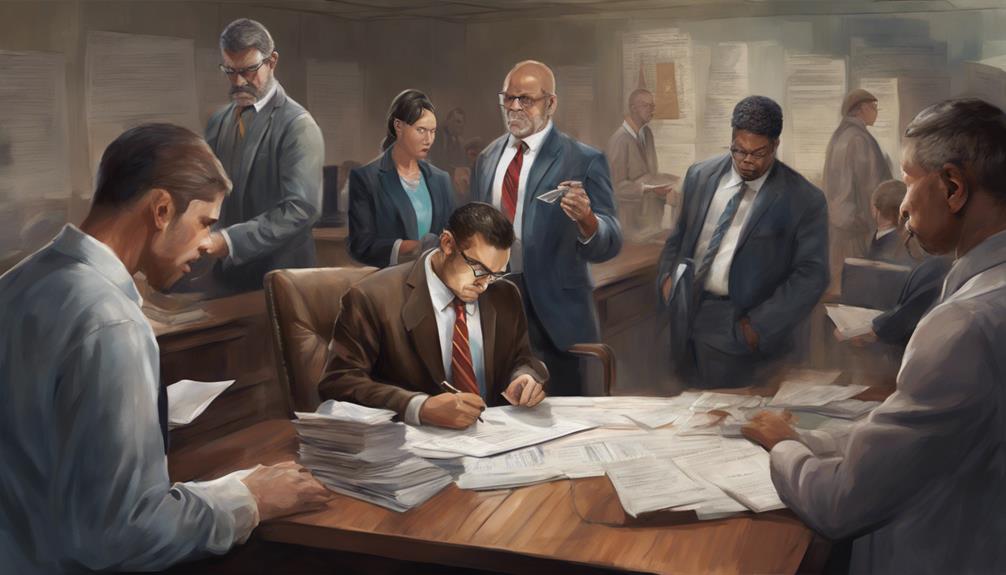
Criminal charges on background checks can have significant implications for individuals seeking employment opportunities. Understanding the nuances of how criminal charges are reflected in background checks is essential for job seekers.
Here are some key points to take into account:
- Types of Charges: Background checks may reveal various kinds of criminal charges, including arrests, convictions, and pending charges.
- Pending Criminal Charges: Background checks might show pending criminal charges that are still unresolved, which could impact a candidate's job prospects.
- Dismissed Charges: Even if charges were dismissed, they might still appear on a background check if they weren't expunged from the individual's record.
- Significance for Job Seekers: Job seekers should be aware of how criminal charges can impact their chances of securing employment and be prepared to address any concerns that potential employers may have regarding their background.
Employer Considerations on Charges
Employers evaluating candidates for job positions often take into account the nature and severity of any charges revealed during background checks. Pending charges, although not convictions, can influence hiring decisions. Employers must adhere to Equal Employment Opportunity Commission (EEOC) guidelines to ensure fair treatment of candidates with pending charges. It is essential for candidates with pending charges to be prepared to provide context and explanations to potential employers. Before making a hiring decision, employers may assess the relevance of pending charges to the job position. This consideration is crucial in determining whether the charges pose a risk or conflict with the responsibilities of the role.
| Employer Considerations on Charges | |
|---|---|
| Pending Charges | Hiring Decisions |
| Nature and Severity | Relevance to Position |
| EEOC Guidelines | Context from Candidates |
Legal Remedies for Background Check Results
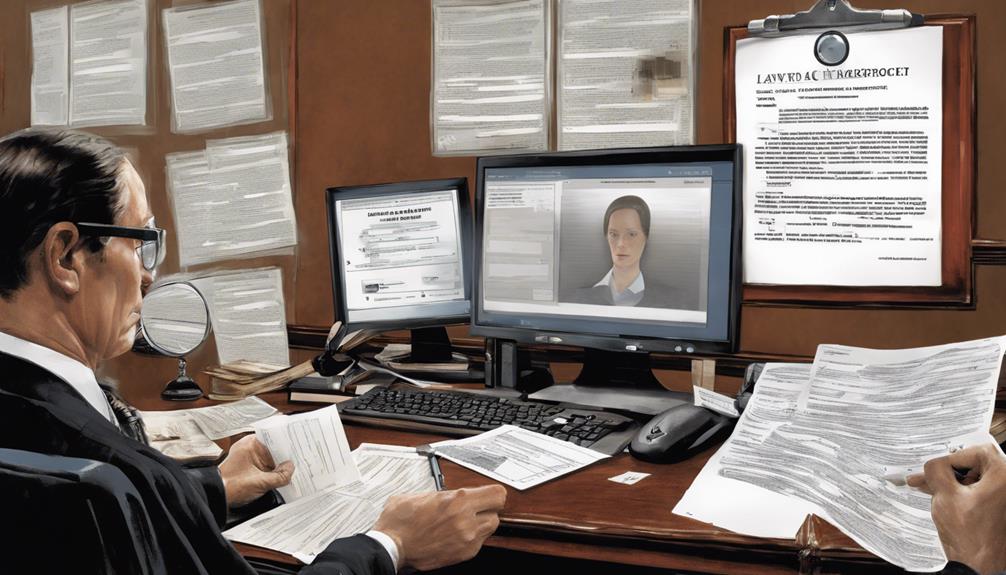
Seeking legal remedies such as expunction offers individuals the opportunity to remove dismissed charges from public record, thereby preventing them from appearing on background checks in Texas.
When considering legal actions for background check results, individuals should be aware of the following:
- Expunction Benefits: Expunction allows for the complete removal of dismissed charges from public databases, ensuring they don't show up on background checks.
- Legal Process: The expunction process involves filing a petition, attending a court hearing, and obtaining a judge's approval before the records can be cleared.
- Impact on Job Applications: After expunction is granted for dismissed charges, individuals can legally deny any past arrests on job applications.
- Clean Slate: Expunction provides individuals with a clean criminal record by making expunged records inaccessible to potential employers conducting background checks.
Frequently Asked Questions
Do Pending Charges Show up on Background Checks in Texas?
Pending charges in Texas will generally appear on background checks conducted by employers. Employers might view pending criminal charges as part of a candidate's criminal history, potentially impacting employment decisions. Handling pending charges carefully is essential to avoid issues.
Do Pending Charges Show up on a Background Check in Michigan?
In Michigan, do pending charges reflect on background checks? Employers may see pending charges depending on the check type and charge severity. Candidates can dispute inaccuracies and explain to potential employers, ensuring fair assessment.
Do Pending Charges Show up on a Background Check in Ny?
Pending charges in New York can show up on background checks, allowing employers to access ongoing legal proceedings. Candidates should address these charges proactively to provide context. Employers may consider pending charges when evaluating suitability for a position.
What Does a Background Check Show in Texas?
In Texas, background checks reveal criminal records, including arrests and court outcomes. Employers can access pending charges info. Education, employment, and credit history may also be included. Knowing this helps candidates prepare for job screenings.
Can Misdemeanors Affect the Outcome of a Background Check?
Yes, misdemeanors on background checks can affect the outcome. Employers often consider the nature and severity of the offense, how long ago it occurred, and how it relates to the job. Some companies may exclude candidates with certain misdemeanors, while others may be more lenient.
Conclusion
To wrap up, charges certainly do appear on background checks! It's like shining a spotlight on a person's past, revealing every misstep and mistake they've made.
So, it's important to address any pending charges head-on and be prepared to explain them to potential employers. Remember, the truth always comes to light, whether you like it or not.
Background Checks
Background Checks Companies in India: Top Picks
Curious about top background check companies in India? Catch a glimpse of Proquest Consulting's cutting-edge AI solutions and expert verifications.

In India, Proquest Consulting shines as a top pick for background checks, employing AI and skilled teams for meticulous verifications. With a track record of screening over 1 lac candidates and spotting 3k discrepancies, they offer dedicated software and personalized support. Their focus on detailed background checks sets high standards in the HR industry. If you're looking for reliable verification services, Proquest Consulting's commitment to privacy and expertise in vetting new hires make them a preferred choice.
Key Takeaways
- Utilizes machine learning for extensive background checks
- Screened over 1 lac candidates and identified 3k discrepancies
- Offers dedicated software and personalized manager support
- Specializes in employee vetting for new hires and senior roles
- Trusted for thorough background screening services
Top Background Verification Companies

Proquest Consulting leads the list of top background verification companies in India. With a reputation for being a trusted partner, ProquestCS stands out as an Indian-based background verification company offering all-encompassing screening solutions.
Their expertise in employee background verification is coupled with cutting-edge technologies like AI and Machine Learning, ensuring global background screening standards are met. ProquestCS boasts a skilled team that has successfully screened over 1 lac candidates, uncovering 3k discrepancies, showcasing their commitment to thorough background checks.
Companies rely on ProquestCS for their meticulous approach to screening, providing peace of mind in the hiring process. By offering dedicated software and personalized managerial support, ProquestCS aims to streamline the verification process, making them a go-to choice for businesses looking for reliable and efficient background screening services.
Leading HR Verification Services
Leading the way in HR verification services is Proquest Consulting, a top-ranked background verification company in India with over a decade of experience. Proquest Consulting has established itself as a global leader in background screening solutions, specializing in detailed background verification for employment purposes.
Utilizing advanced technologies like AI and Machine Learning, Proquest Consulting offers professional background checks, including education and employment verification, to assist companies in making informed hiring decisions.
With a track record of identifying 3,000 discrepancies in their verification processes and screening over 100,000 candidates, Proquest Consulting has built a reputation as one of the most trusted background verification companies in India. Their specialized team, dedicated software, and assigned manager for seamless processes have made them a go-to choice for numerous companies seeking thorough and reliable background checks.
Proquest Consulting's commitment to excellence has set a high standard in the industry for effective HR verification services.
Trusted Background Check Providers

A key aspect of trustworthy hiring decisions lies in partnering with reputable background check providers in India. When it comes to trusted background verification companies in the country, Proquest Consulting stands out with over a decade of industry experience.
Having screened more than 1 lac candidates and uncovered 3k discrepancies, ProquestCS offers a thorough range of services including employee screening for various corporate sectors. Their specialization in vetting new hires and senior-level positions ensures a detailed background verification process that includes employment verification and criminal background checks.
ProquestCS is known for its commitment to data privacy and provides dedicated software along with a dedicated manager as a single point of contact, streamlining the hiring process for their clients. Many companies rely on ProquestCS for their reliable and precise background screening services.
Reliable Verification Firms
When seeking reliable verification firms for background checks in India, companies look for established providers with a proven track record of accuracy and efficiency.
Proquest Consulting stands out as one of the best background verification companies in the country, boasting over a decade of experience in the industry. With a focus on thorough background check services, ProquestCS utilizes AI and Machine Learning technologies to offer a wide range of screening solutions.
Their global background verification company has screened over 1 lac candidates, identifying 3k discrepancies, and providing trusted background check services to various corporate sectors. ProquestCS not only offers reputable background verification services but also specializes in employee background screening services, ensuring meticulous checks on criminal, educational, and credit histories.
Clients benefit from their dedicated software and assigned manager for a seamless experience, making them a top choice for companies looking to build skilled and reliable long-term teams.
Top Picks for Background Checks

Proquest Consulting emerges as a top contender among the best picks for conducting thorough background checks in India.
As a leading Indian background verification company, ProquestCS leverages machine learning algorithms to offer extensive background verification checks, including criminal record checks, employment verification, and more.
With a track record of screening over 1 lac candidates and spotting 3k discrepancies, ProquestCS stands out for its commitment to accuracy and reliability.
Their dedicated software, personalized manager support, and extensive database coverage guarantee swift turnaround times and seamless integration into the recruitment process.
Trusted by numerous companies across various industries, ProquestCS focuses on creating strong, skilled teams for their clients, making them a preferred choice for background screening and verification services in India.
For those seeking the best background check services, Proquest Consulting is a top recommendation with a proven reputation for excellence.
Frequently Asked Questions
What Is the Most Popular Background Check Company?
The most popular background check company is HireRight. They serve over 240 countries worldwide and provide a full range of background check services. Many industries trust HireRight for their reliable and thorough background verification needs.
Which Company Has Strict Background Verification in India?
In India, Proquest Consulting stands out for its rigorous background verification process. With over 3k discrepancies identified, their attention to detail shines. Trusted by many, their specialized team guarantees thorough screening across various sectors.
What Background Check Do Employers Use in India?
Employers in India utilize background checks to verify education, employment history, criminal records, identity, and references of potential candidates. These checks are essential for ensuring credibility, reliability, and integrity in the Indian workforce, aiding informed hiring decisions.
What Is the Highest Level Background Check?
The highest level background check involves thorough examination of an individual's criminal, financial, educational, and professional history. It includes scrutiny of international records, credit history, and reference checks, essential for positions of high trust and responsibility.
Can Tabb Background Checks be Considered as one of the Top Picks for Background Check Companies in India?
When considering background check companies in India, the reliability of Tabb background checks makes it a top pick for many. With its comprehensive screening services and efficient processes, Tabb has gained a reputation for delivering accurate and thorough results, making it a trusted choice for businesses and individuals alike.
Conclusion
To sum up, when it comes to background checks in India, these top picks for verification companies are the go-to choice for reliable and trusted services.
Did you know that according to a survey by NASSCOM, over 70% of Indian companies conduct background checks on potential employees before hiring them?
This statistic highlights the importance of thorough verification processes in today's competitive job market.
-

 Background Checks4 months ago
Background Checks4 months agoFind Someone Fast: People Search by Birthday
-

 Background Checks4 months ago
Background Checks4 months agoThe Truth About Cyber Background Checks: What You Need to Know
-

 Arrest Warrants4 months ago
Arrest Warrants4 months agoMissouri Arrest Warrants: How to Find Them
-

 Arrest Warrants4 months ago
Arrest Warrants4 months agoWarrants for Arrest in NY: Search and Information
-

 Arrest Warrants4 months ago
Arrest Warrants4 months agoSearch Arrest Warrants: A Complete Guide
-

 Background Checks4 months ago
Background Checks4 months agoNew Law on Background Checks in Texas: What Has Changed
-

 Arrest Warrants4 months ago
Arrest Warrants4 months agoActive Arrest Warrants – Why You Should Care About Them
-

 Arrest Warrants4 months ago
Arrest Warrants4 months agoVirginia Arrest Warrants: How to Look Them Up













